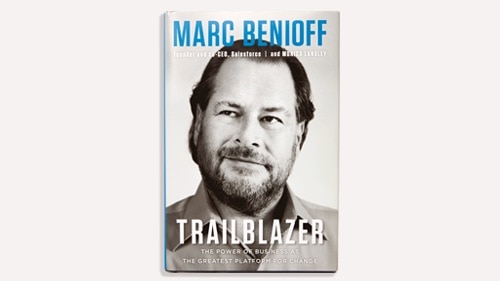“I was supposedly living the American dream, but I was lost.”
That’s the opening line by Marc Benioff in his soon-to-be-published book, Trailblazer: The Power of Business as the Greatest Platform for Change, that I co-authored with him.
This poignant moment as a young executive at a huge software company in the 1990s led Marc to an important turning point: he went on a sabbatical to India, among other places, and committed himself to someday starting a company that would reflect his values and fulfill his soul, not just his bank account.
Today, many millennials echo that same sentiment. In fact, millennials, who now make up almost half of the U.S. workforce, want to work at companies that make a positive impact on society, care deeply about the planet, and promote equality.
Glassdoor’s 2019 Mission & Culture Survey found that over 77% of adults across four countries (US, UK, France, Germany) would consider a company’s culture before applying for a job there. Furthermore, over half of the respondents said that company culture is more important than salary when it comes to job satisfaction.
Changing the world is everybody’s business
While building one of the fastest-growing enterprise software companies in history, Marc realized that he wasn’t alone in his mission to live by his values and be a force for good. Salesforce’s employees, customers, partners, communities, and other stakeholders have also shared the same commitment since day one of Salesforce’s existence.
It started with the roll out of the 1-1-1 philanthropic model in which Salesforce set aside 1% of its equity, product, and employee time for charitable causes. And over the last two decades, Salesforce has proven that addressing issues affecting communities, from public education and workforce development to homelessness and health of the planet, is not in conflict with creating shareholder value.
Building a purposeful culture is not easy. Values can’t be an abstract, aspirational notion, or worse, merely words on a corporate slide or plaque. They must truly become part of the company’s DNA.
How Marc rooted Salesforce in shared values and culture
In Trailblazer, Marc traces the evolution of Salesforce’s culture, describing how the core values of trust, customer success, innovation, and equality shaped how the company operates. For example, he describes how employees–living their values–asked him and the company to take a stand against legislation that would have permitted businesses to discriminate against the LGBTQ community in Indiana, where Salesforce had its second-largest hub. Marc became the first major business leader to speak out against the law by threatening to scale back Salesforce’s investment in the state. That experience laid the foundation for Marc’s role as an activist CEO and his belief in the company as a platform for change.
In the past, nurturing a culture with a conscience was “something most people would categorize on a company’s balance sheet as ‘other,’” Marc writes. “But that’s no longer the case. No business will succeed in the future until it embraces the notion that values create value.”
To learn more about the power of culture and values on the success of a business, preorder your copy of Trailblazer.




























